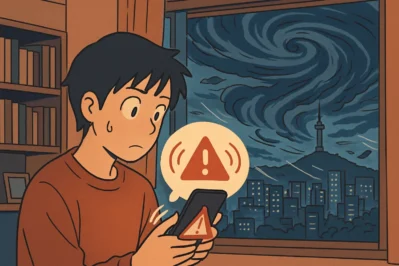Stay Safe in Korea: Read Typhoon Alerts!
Hello! This is Maeil Hangeul (Daily Korean), here to upgrade your Korean skills!
Have you ever been in Korea during the summer or early fall? If so, you might have heard the word 태풍 (taepung), or typhoon, a lot! Understanding weather news, especially warnings, is a super important skill for staying safe and planning your days.
Lately in Korea, the summer weather has been unpredictable, which means typhoon season is in full swing. You’ll see alerts on the news and even get them on your phone. Today, we’ll learn the essential Korean vocabulary to understand a typhoon advisory, so you can be prepared and feel confident! Let’s get started!
Core Expressions You Need to Know
Here are four key phrases you’ll see in every typhoon news report.
1. 태풍 (Typhoon)
- Pronunciation: [Tae-pung]
- English Meaning: Typhoon
- Detailed Description: This is the most basic and important word! A 태풍 (taepung) is a large, powerful storm, just like a hurricane or a cyclone. You’ll hear this word constantly on the news when a storm is approaching Korea.
2. 주의보 (Advisory / Warning)
- Pronunciation: [Ju-ui-bo]
- English Meaning: Advisory / Warning
- Detailed Description: This is a more formal word you’ll find in official announcements and news articles. It’s often combined with other words. For example, 태풍 주의보 (taepung ju-ui-bo) means “Typhoon Advisory.” If you see or hear this, it means “Pay attention! A typhoon is coming, and you need to be cautious.”
3. 강한 바람 (Strong Wind)
- Pronunciation: [Gang-han ba-ram]
- English Meaning: Strong wind
- Detailed Description: This phrase breaks down into 강하다 (ganghada), meaning “to be strong,” and 바람 (baram), meaning “wind.” News reports will always mention 강한 바람 to warn people about the powerful winds that can be dangerous.
4. 안전에 유의하세요 (Please be careful for your safety)
- Pronunciation: [An-jeon-e yu-ui-ha-se-yo]
- English Meaning: Please pay attention to your safety / Please be careful.
- Detailed Description: This is a polite and formal phrase used in public announcements to urge people to be safe. 안전 (anjeon) means “safety.” You’ll hear this at the end of a news report or see it written on warning signs. It’s a very caring way to tell people to stay out of harm’s way.
Example Dialogue
Let’s see how these words are used in a real conversation! Imagine two friends, Minjun and Chloe, have to change their plans.
A (Chloe): 민준 씨, 뉴스 봤어요? 태풍이 오고 있대요.
Minjun, did you see the news? They said a typhoon is coming.
B (Minjun): 네, 저도 봤어요. 휴대폰으로 태풍 주의보 문자를 받았어요.
Yes, I saw it too. I got a Typhoon Advisory text on my phone.
A (Chloe): 내일 강한 바람이 불고 비가 많이 온다고 해요. 우리 한강 공원 계획은 취소해야겠어요.
They say there will be strong winds and a lot of rain tomorrow. I guess we have to cancel our plans for Han River Park.
B (Minjun): 맞아요. 안전에 유의하세요! 대신 집에서 치킨 시켜 먹고 영화 봐요!
That’s right. Please be careful! Let’s order chicken and watch a movie at home instead!
Culture Tip: That Scary Alert Sound!
If you’re in Korea during a typhoon, you’ll definitely experience the 긴급재난문자 (ging-geup-jae-nan-mun-ja), or Emergency Disaster Alert Message.
Suddenly, your phone will make a very loud, very alarming siren sound, and a message will pop up on your screen. Don’t panic! This is the government’s way of sending urgent information to everyone. It will usually contain the words we learned today, like 태풍, 주의보, and telling you what areas to avoid.
Koreans are very used to this system. While the sound can be shocking at first, it’s an incredibly efficient way to keep everyone informed and safe. So if your phone suddenly screams at you, now you know why!
Let’s Review and Practice!
Great job today! You’ve learned four essential phrases for understanding Korean typhoon warnings. Now you can read simple news alerts and know what’s going on.
Practice Time!
Fill in the blank with the correct word we learned today.
- A big storm is coming to Jeju Island. This storm is called a __________.
- The news anchor finished the weather report by saying, “안전에 __________!” (Please be careful for your safety!)
Leave your answers in the comments below! Try making your own sentence with 강한 바람 (strong wind).
Stay safe, and see you in the next lesson from Maeil Hangeul






